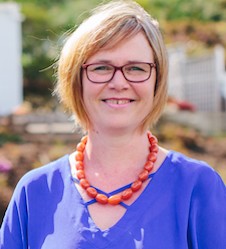Tuesday 19 March 2019 11:13am

Dr Trudie Walters
Working at a bank in South Dunedin was the inspiration for a University of Otago lecturer to co-write and co-edit what’s thought to be a first-of-its-kind international text book.
Marginalisation and Events, published by Routledge, Taylor and Francis Group, is the brainchild of Department of Tourism lecturer Dr Trudie Walters and has chapters featuring the impact of the South Dunedin Street Festival (written by Dr Walters) and Queenstown’s Gay Ski Week (written by University of Otago’s Dr Willem Coetzee). Another looks at Auckland’s queer Pacific FAFSWAG Ball (written by Dr Jared Mackly-Crump of AUT and Dr Kirsten Zemke, from the University of Auckland). It is edited by Dr Walters and Dr Allan Jepson, of the University of Hertfordshire.
Dr Walters says there are no other text books which focus on the impact of events on marginalised groups. Along with the two Otago chapters, it has case studies of events written by contributors from Australia, South Africa, Brazil, Portugal, Afghanistan, Italy, the United States and the United Kingdom.
Marginalisation has been the subject of academic research for some time now, but little research has been carried out within the field of event studies, the book claims.
Using a range of different theoretical and methodological approaches from a variety of disciplines, the volume applies a critical approach to events as they relate to marginalisation. It seeks to address the how and why, and provide a holistic picture of their place and influence in the lives of marginalised individuals and communities.
Having worked at a bank in South Dunedin before entering academia, Dr Walters says she became aware of the issues faced by that community.
“South Dunedin is a marginalised community. It has stigma attached to it. Having worked there I found that stigma wasn’t really justified.
“There are many different demographics in South Dunedin; people with limited mobility, low socio-economic status and elderly. I thought it was about time their story got told,” she says.
As part of her research, Dr Walters spoke with organisers and attended the 2017 street festival and spoke to attendees. Her conclusion of the event was a positive one.
“It helped get people out and gave them something to look forward to. A number of people said South Dunedin needed, not just wanted, but needed this thing.”
She says the festival was seen as good for the community in three ways; it showcased local community groups, it helped generate a sense of pride among local residents and it was accessible and enjoyable.
The organising committee deliberately sought to make the festival an inclusive event that represented the diversity of its residents and their interests.
“As a result of this intentional decision-making, the event allowed South Dunedin residents to celebrate the uniqueness of the suburb and focus attention on themselves.”
Not all case studies undertaken for the book were as positive. Some recognised that disabled people felt marginalised by events that did not cater for their disabilities.
“In some cases it was easier for them to stay at home, rather than go to the effort of trying to get there and get around.”
Other chapters highlighted the problems faced by homeless people and other marginalised groups when major events were held in a city.
The text book would be mainly of interest to researchers and academics, but Dr Walters hoped it would spark a broader discussion.
“I’d be really happy if it starts conversations and helps people to realise that events in or for marginalised communities are important … and that they can help to improve people’s quality of life if they are run in the right way.”
The book came off the press on January 10.
“We’ve had lots of interest and really good comments. I’m stoked with it and looking forward to it coming out,” Dr Walters says.
